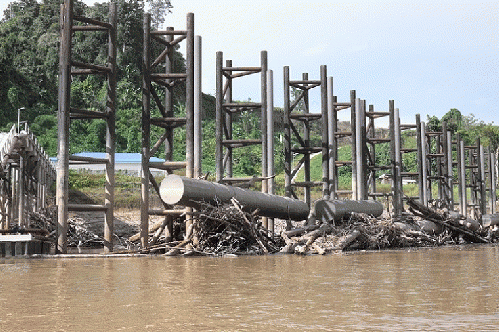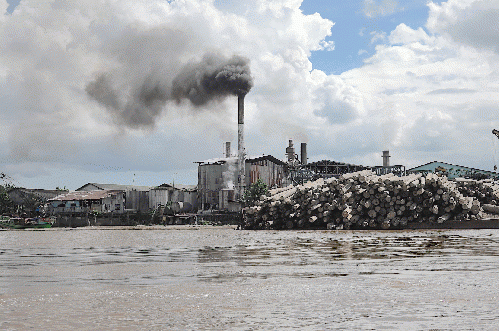This piece was reprinted by OpEd News with permission or license. It may not be reproduced in any form without permission or license from the source.
[First published by New Eastern Outlook]
When an airplane is approaching Singapore Changi Airport, it makes the final approach either from the direction of Peninsular Malaysia, or from the Indonesian island of Batam.
Either way, the scope for natural disaster under the wings is of monumental proportions.
All the primary forest of the Malaysian state bordering Singapore -- Johor -- is now gone and the tremendous sprawl of scarred land, mostly covered by palm oil plantations, is expanding far towards the horizon. The predictable plantation grid pattern is only interrupted by motorways, contained human settlements, and by few, mostly palm oil-related industrial structures.
On the Indonesian side, the Island of Batam resembles a horror apocalyptic movie: there is always some thick smoke rising towards the sky, and there are clearly visible, badly planned and terribly constructed towns and villages. Water around the island is of a dubious, frightening color. The environmental destruction is absolute. Batam was supposed to be the Indonesian answer to Singapore. Indonesia was dreaming about a modern mega city with a super airport and port, dotted with factories, research centers and shopping facilities. But the turbo-capitalist country hoped that all this would be created by the private sector. That was of course, unrealistic. What followed was an absolute disaster.
As it is now, Batam is nothing more than a series of 'Potemkin Villages', complete with several potholed four-lane roads that lead nowhere. As for the research: there is hardly any science even in Jakarta or Bandung, let alone here. After several attempts to 'save face' and to cover up this massive failure, the island has been allowed to 'sink' back to where it had already been for several decades: a huge whorehouse for predominantly Singaporean and Malaysian sex tourists; a cheap shopping district selling mainly counterfeit goods, a place notorious for lacking even the most basic public services.
No heads were made to roll for this monumental and thoroughly stupid set of failures. The obedient business-owned media is hardly ever critical of the Indonesian regime and its business 'elites'. But the impact of the 'Batam experiment' is enormous -- there is no intact nature left on the entire island.
*
What goes on in the Southern Part of Southeast Asia?
Is nature of absolutely no concern to the Malaysian and especially Indonesian governments, business conglomerates and society?
The problem here is that everything above and below the ground has been, for years and decades, viewed as a source of potential profit. It is only valued if it can be exploited, if there can be a price tag attached to it. No sentimentality, no thoughts about beauty! Here, greed has already reached insane proportions.
Like in the West, big companies in several Southeast Asian countries are now running and selecting the governments. They are also controlling the mass media, infiltrating social networks. To criticize great logging and palm oil companies in Malaysia is lethal, literally suicidal, and almost no one dares to do it. In the past, some did, and died. The same can be said about 'illegal' gold mining, logging and other extraction ventures in Indonesia, where much of the unsavory mining and logging enterprises are in the hands of the police, military or of government officials (the interests of all three branches are also often intertwined).
Places like Borneo and Sumatra are finished; almost all of their legendary wildlife habitats are devastated. Hundreds of species are gone or almost extinct. The once mighty, primary forests are squeezed into a few national parks, and even those are often being used for commercial farming, and also for palm oil plantations.
(Note: You can view every article as one long page if you sign up as an Advocate Member, or higher).








